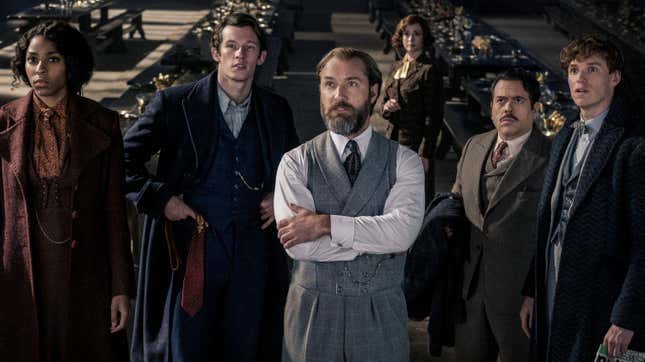
Back in 2016, there was something welcoming and old-fashioned about Fantastic Beasts And Where To Find Them, the genial first installment in J.K. Rowling’s Harry Potter spinoff book series. On the heels of an ugly U.S. election, the franchise’s main character, Newt Scamander (the ever-bashful and lovably awkward Eddie Redmayne), exuded a sorely needed compassion and humanity as an empathetic, Roaring ’20s-era Magizoologist devoted to rare, unfairly feared and misunderstood creatures.
No one could have predicted where this charming offshoot would go from there in search of a common ground between worlds, species and ideologies, but the 2018 follow-up The Crimes of Grindelwald sadly did not take it in the right direction. A good-looking yet convoluted mess, the sequel demanded loads of prerequisite homework that not even Hermione Granger would find enjoyable.
Another four years after that two-plus-hour headache comes the still-longer The Secrets Of Dumbledore, which arrives with even more baggage than its predecessors. Between Rowling’s inexplicably persistent transphobia on social media and Johnny Depp’s very public legal battles with ex-wife Amber Heard involving domestic abuse and other claims, it seems almost impossible for viewers to immerse themselves in another meticulously designed wizarding world without intrusions from muggle creators.
While it’s surprisingly easy to accept Mads Mikkelsen in place of Depp as dark wizard Gellert Grindelwald, it serves more as proof of the franchise’s embarrassingly inconsequential nature. Directed again by David Yates, helmer of the final four Harry Potter films and every Fantastic Beasts entry, the impact of the whole saga feels so frivolous that it barely matters who plays one of its most important characters.
Mikkelsen puts his weirdo-cool facial gestures and hint of darkness to decent use as Grindelwald, offering a dynamic alternative to Depp’s stony façade. In Secrets, viewers get even more backstory about events teased by its predecessors, including the romantic nature of the relationship between Albus Dumbledore (Jude Law) and Grindelwald. After making an anti-muggle blood pact “for the greater good,” a remorseful Dumbledore changes his mind, explaining to Grindelwald, “I was in love with you.” But like many other queer readings or revisions that Rowling has coyly teased across the Potter-verse, the line marks another innuendo that she and co-writer Steve Kloves frustratingly refuse to fully explore, much less actively confirm, even while there’s plenty of room elsewhere for romantic love in the franchise.
Despite his absence from the films’ titles, the main character is still Scamander, whose first task is to guide a graceful, fawn-like creature called Qilin through childbirth. Dark wizards intervene during the birth in one of the film’s rare moments of emotional intensity, while elsewhere Professor Eulalie Hicks (The Secrets Of Dumbledore MVP Jessica Williams) tries to draw forlorn baker Jacob Kowalski (Dan Fogler) out of his misery for a secret quest after the muggle was left by his platinum-blonde lover Queenie Goldstein (played wondrously by Alison Sudol) in The Crimes Of Grindelwald.
Also in the mix are the murkily vengeful Credence Barebone (Ezra Miller); a gloomy Dumbledore allegedly abandoned by Albus’ brother Aberforth (Richard Coyle); Newt’s brother Theseus (Callum Turner); the young Minerva McGonagall (Fiona Glascott); and a labyrinthine assortment of supporting characters that require their own appendix to keep straight.
The most bewildering thing about The Secrets Of Dumbledore is how superfluous each of its ideas feel in relationship to one another. There are countless globe-trotting international characters, worlds-within-worlds, and constantly competing historical, political, and mythological references, but they all fizzle because their ill-considered stakes never seem fully realized. While Credence’s journey is particularly intriguing, it rarely feels like part of a cohesive whole. Rowling the screenwriter feels like she’s too heavily obligated to Rowling the author, as her work here highlights her gifts as a plotter and world-builder but also her relative inexperience with the demands of more streamlined, cinematic storytelling.
So despite Yates’ attractive orchestration, costumer Colleen Atwood’s impeccable, era-appropriate menswear-leaning garments, and the magical production design by Stuart Craig and Neil Lamont, the magic-focused film series never quite finds the enchanted spark that made the Harry Potter franchise so urgently essential. By comparison, the overall story told in the Fantastic Beasts films feels more like an overlong book—one with missing chapters. The familiar grounds of Hogwarts and the fairy dust of composer John Williams’ iconic Harry Potter theme only make us wish we were watching that film series instead of this humorless slog.
What’s saddest about The Secrets Of Dumbledore is the importance of what it actually has to say. It’s not only a tale of good versus evil, but a story about embracing change and progress, accepting culpability for wrongdoing, learning from mistakes, and growing as a good citizen of the world in a maddening era of both-sides equivocation. Based on the headlines they’ve generated over the four years since the last film, some of its creators might want to explore those ideas a bit more closely in their real lives. Up on screen, it’s clear they were too busy digging through a mountain of their own mythology to extract the more relevant lessons underneath.